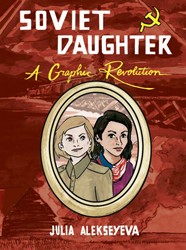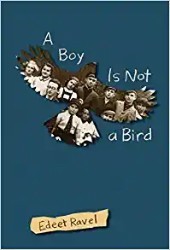“I paint unflattering portraits of everything,” admits the cynical but often intensely sincere narrator of Anya Ulinich’s first graphic novel, Lena Finkle’s Magic Barrel. Lena Finkle shares many traits with the central character of Ulinich’s prose-based debut novel, Petropolis, which was first published in 2008 and presented a seethingly humorous coming-of-age tale about a Siberian-born girl, Sasha Goldberg, who flees Russia for Arizona as a mail-order bride in search of her absent father. Both women share a sense of continually feeling at odds with everyone and everything around them, and of finding solace mainly in the worlds of art and literature and, on occasion, in friendship and sex.
Ulinich has translated this world of experience into a text that is manifestly, and intensely, crowded: in Lena Finkle’s Magic Barrel, each page attests to the claustrophobic sensibility of a life lived frantically searching for answers, for meaning and for purpose. “What I want most, is to keep moving — forward, toward the unknown…” Lena may be boldly grasping for an as-yet-unnamed future promise, but she is continually harassed by memories — of her Soviet past, her childhood influences and expectations, her romantic misadventures and ministrations. Within the first of four sections of the book, we learn of the Hasidic couple who tries to make Lena into a “proper” Jew when she first moves with her family to Arizona in the early 1990s, of her subsequent marriage to her first husband, Chance, a clerk at a local 7/11 who insists on calling her “Anne Frank” when he learns that she is Jewish, of her affinity for reading — from Dostoevsky to the Declaration of Independence. In the present of the narrative, at thirty-seven years old Lena Finkle is recently twice-divorced, living in Brooklyn as a published author and the mother of two girls, and on the brink of a self-identified “sexual awakening,” to take place with the help of an online dating site.
Lena’s greatest strength, her ability to mine the various and textured layers of experience and consciousness that inform every moment, does not bring her any closer to her goal of finding a storyline and a sense of identity that suits her. She is often painfully aware of the ways this capricious search shades and shapes how she sees herself and the world around her. The artwork in Lena Finkle’s Magic Barrel is quite ingeniously constructed — sloppy and rushed at times, fleetingly beautiful at other times. Each page’s visual sensibility reinforces the restless force of emotions — of hope, anxiety, and courage, to name just a few — that drive Lena’s quest. This brilliant graphic novel visualizes various metaphors of immigration, compounding and sometimes even muddling them as the narrator attempts to convey what it means to be trapped between worlds. As another powerful composer of the immigrant experience, Anzia Yezierska, once wrote, “Between my soul and the American soul were worlds of difference that no words could bridge over.” Ulinich here presents us with an ambitious exclamation of the limitations of words, even when juxtaposed with images; they can never bridge, but they can, if only remotely, gesture to the spaces in between.
Related Content:
- Sami Rohr Prize Awardees
- Reading List: Graphic Novels and Comics from a Jewish Perspective
- Reading List: Saul Bellow
- Reading List: Emerging Voices
Interview
Tahneer Oksman’s interview with Anya Ulinich can be found here.



